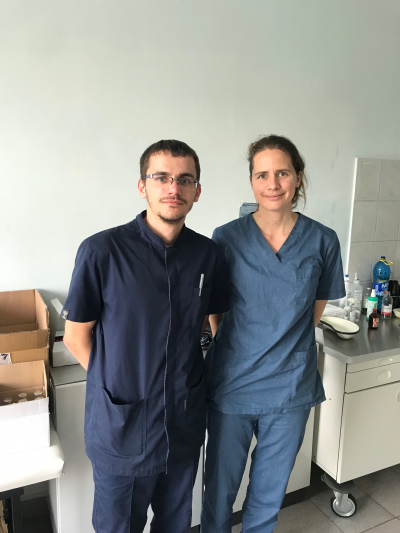“If not me, then who?”
Rostyk, a physical therapy assistant with HI, is working to improve rehabilitation care in Ukraine.

Rostyk, a physical therapy assistant in Ukraine. © HI. | © HI
22-year old Rostyk is from Lviv, Ukraine and is a physical therapy assistant in HI’s emergency rehabilitation response to the ongoing conflict.
When war broke out in February, Rostyk started looking for how he could help. His university teachers reassured him that his ability to treat people would be an important contribution in the time of crisis. He joined HI’s teams and has been working alongside physical therapists to care for war-wounded patients in the West of Ukraine.
“I have seen patients with burns on their whole body and patients with amputations of their fingers, toes, legs, and arms,” Rostyk explains. “One of my patients, who is about 30 years old, was injured by a mine blast. He has been amputated two times, once at his ankle, and once from his knee down. At first, he was doing well, but then he fell into a deep depression because he was suffering phantom pain[1]. Painkillers and medicine weren’t helping him, but he says that physical therapy is the one thing that reduces his pain, which has been really incredible.”
Rostyk strives to improve care
Faced with an increase in need, many hospitals throughout Ukraine lack  sufficient staff and specialized services to care for patients with burns and amputations. HI is working alongside hospitals to reinforce their care capacity and provide theoretical and on-the-job training in these specialized rehabilitation fields.
sufficient staff and specialized services to care for patients with burns and amputations. HI is working alongside hospitals to reinforce their care capacity and provide theoretical and on-the-job training in these specialized rehabilitation fields.
“In all of Ukraine, we have only a handful of physical therapists working in burns,” Rostyk explains. “We have a lot of people with burn injuries, but almost no physiotherapists or occupational therapists. When I was at university, I didn’t learn about physical therapy in burns. I want to bring quality physical therapy to Ukraine, and working with HI gives me more experience with international standards. I hope that I can change the sector in this country, so that Ukraine can have the best physical therapy in the world. If not me- then who? It’s that simple.”
[1] A disorder in which severe chronic pain related to psychological conflicts causes substantial distress or impairment in functioning




